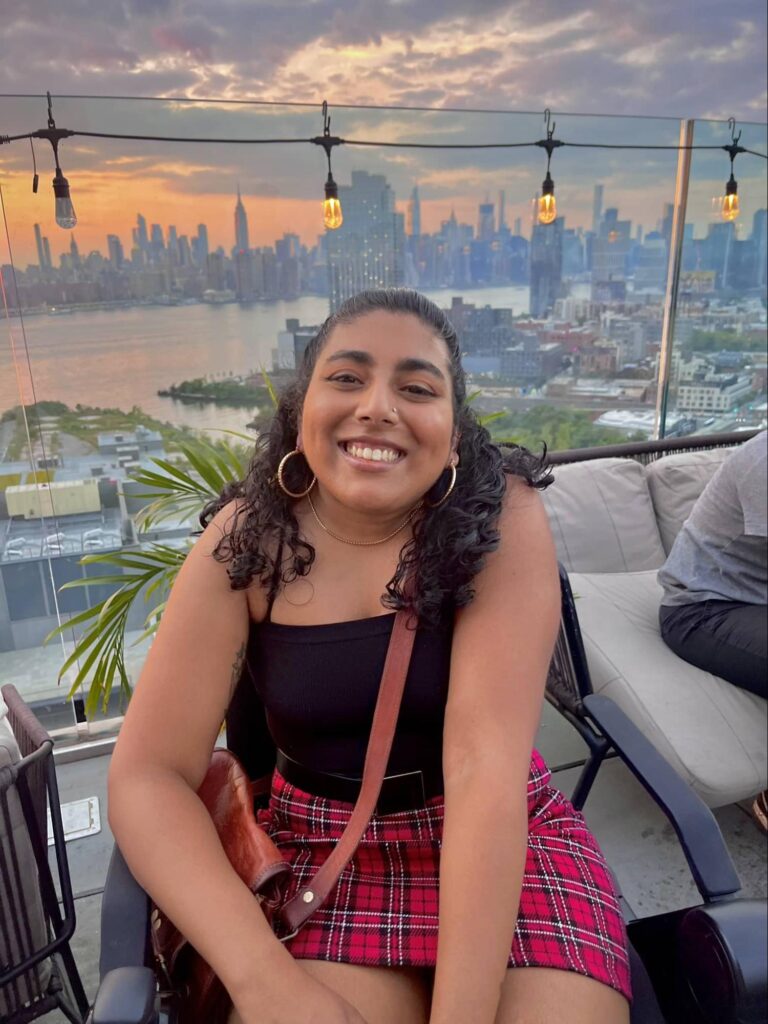
Shruti Rajkumar, a brown femme presenting person with curly black hair, sitting in their wheelchair and smiling with the Manhattan skyline in the background. They are wearing gold hoop earrings, a black top, a red checkered skirt and a brown bag around their body.
Growing up, I was stripped of my autonomy in medical spaces. Mental health was stigmatized in my family and culture, so I didn’t feel comfortable seeking care. In terms of my physical health, doctors never treated me like a person with agency and autonomy, and all medical decisions were made by the adults in my life who thought they knew better than me about what my body needed. I never felt like I had a voice to advocate for myself, for what I felt would increase my quality of life.
Last year, I was in a very privileged position. I was working in my dream job, and had access to incredible health insurance that allowed me to take my physical and mental health into my own hands with the help of my psychiatrist, therapist, and holistic practitioners. Through these supports, I was able to check myself into a partial hospitalization program, attend bi-weekly therapy sessions, and attend sessions for physical therapy, acupuncture, massage therapy, and chiropathy.
But everything changed at the start of the year when I lost my job in February. Since then, I have been living on savings and unemployment benefits, and am now on Medicaid. Recently, President Donald Trump made sweeping policy changes that will harm the lives of millions of disabled Americans. A new bill recently signed into law will reduce Medicaid spending by $911 billion over the next 10 years, which could cause 10.3 million people to lose Medicaid coverage.
I can already see the ways I am losing medical autonomy and access. Since getting on Medicaid, I have lost significant support, such as needing to reduce the number of weekly sessions I have with my therapist because they don’t accept Medicaid, and I can’t afford to pay out of pocket for more sessions. I had to stop going to my holistic practice for the same reason, and I have been watching my physical health decline ever since. Of course, I could find other practitioners, but doing so is a risk: it’s rare to find physical therapists and other specialists who actually respect disabled autonomy and set you up to reach your own goals, rather than goals imposed on you by doctors who think they know better. Still, Medicaid has given me the security of knowing that if anything were to happen to me, I would be able to be treated by the necessary doctors at a cost that is affordable to me.
I’ve struggled with my health needs while on Medicaid, and yet it’s still a huge safety net for me, which demonstrates the importance of having access to health insurance. Even with minimal income, I’m still able to see doctors and specialists, and it’s been a huge relief to know that I would have access to them if I faced any urgent medical challenges. But imagine what would happen if we all didn’t have access to health insurance at all? I worry for those who will be disproportionately impacted by what’s to come.
Disabled advocates have warned legislators and the public about the dangers of the cuts to Medicaid. This will have a detrimental impact on all disabled Americans, and particularly on low-income Black and brown disabled people. Not only do we need to protect access to Medicaid, but we also need to ensure that the government is continuing to fund it so that myself and people with higher support needs still have access to quality healthcare while on Medicaid. Disabled people, and all people, deserve to be able to live their lives with all the support that they need, and the government needs to make that a priority.
Shruti Rajkumar is a freelance reporter and former AAPD intern (‘22). They have bylines in NPR, HuffPost, The Boston Globe Magazine and more.
